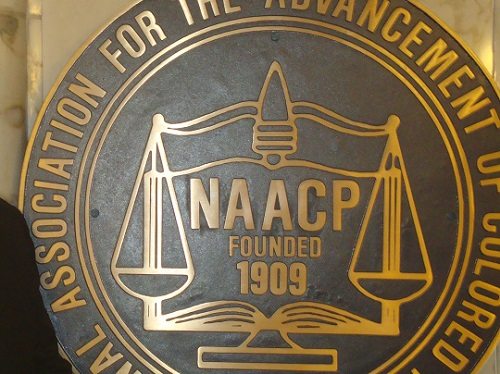
May 18, 2014; BET (Associated Press)
The new president of the NAACP, Cornell Brooks, appears to be a credible choice to run the nation’s largest and oldest civil rights organization. A Yale-educated lawyer who also holds a Master’s in Divinity from Boston University, Brooks was the president and CEO of the nonprofit New Jersey Institute for Social Justice based in Newark, known for research and advocacy on behalf of inner-city residents in the Garden State. Among the issues that the Institute had addressed during Brooks’ time at the helm have been zero-tolerance school discipline policies, juvenile detention alternatives, community benefit agreements with anchor institutions, an environmental job training program for unemployed Newark residents, and expansion of federally qualified health centers, just to name a few.
Sign up for our free newsletters
Subscribe to NPQ's newsletters to have our top stories delivered directly to your inbox.
By signing up, you agree to our privacy policy and terms of use, and to receive messages from NPQ and our partners.
Running the NAACP wasn’t an easy road for Ben Todd Jealous and won’t be any easier for Cornell Brooks. Some of the challenges are on the policy side:
- Brooks told the Associated Press that he was “a beneficiary, an heir, and a grandson” of the Supreme Court’s Brown v. Board of Education decision overturning the “separate but equal” doctrine in public education. That decision, along with the Civil Rights Act of 1965, was a landmark achievement for the NAACP and the civil rights movement. The resegregation of public schools in the U.S., exemplified by the recent study that more than half of Miami-Dade schools are now racially “isolated” (with student populations comprised of one ethnic or racial group), indicates that the problem is real and demonstrable, made more difficult by the nation’s changing racial demographics. Voting rights are under attack in many states due to restrictive and unnecessary voter ID laws. Other benchmark civil rights laws have been weakened in Congress and in the courts. Brooks inherits a leadership organization that has to deal with state and federal efforts that have been chipping away at or sometimes undermining those achievements. Reversing the momentum of public policy that has been steering away from the priorities of the civil rights movement is going to be on the organization’s agenda.
- In addition to diplomas from Yale and Boston University, Brooks also holds a certificate of having graduated from Head Start, one of the original anti-poverty initiatives emanating from the War on Poverty. Federal support for anti-poverty initiatives has been on the cutting block for some years now. Many outside of the anti-poverty movement view community action as a failure, and many inside suggest that it needs to be reinvigorated and perhaps somewhat reinvented. Young people may not remember, much less feel the importance of the War on Poverty that emanated from the racial and economic inequities that were endemic in American society. Can Brooks reconnect and reinvigorate support for a new War on Poverty, given that in recent years, poverty in the U.S. has actually remained stagnant or even increased?
Other challenges relate to the internal dynamics of the NAACP and its more than 2,000 local branches, councils, and chapters:
- The decision of the Los Angeles chapter of the NAACP to try to award a second lifetime achievement award to Donald Sterling, the owner of the Los Angeles Clippers, has raised scrutiny of how local NAACP chapters have been raising money, causing some collateral damage to the credibility and brand of the organization. Sterling was well known for his repugnant discriminatory attitudes long before being outed by his paramour, V. Stiviano, on tape, but whatever he was giving or promising to give the Los Angeles chapter of the NAACP was sufficient in the minds of the chapter’s leadership to overlook his racially charged behavior. With news of more incidents of individuals and corporations charged or convicted of racial bias in housing, employment, and bank lending buying their way out of such problems by giving big sums to the NAACP, critics such as Occidental College’s Peter Dreier have eviscerated the organization, with Dreier noting “The NAACP, with its glittering history of incredible activism, has become an empty shell.” The problem of appearing to have the NAACP’s sympathy if not silence purchased by entities guilty of racial discrimination is not new, and Brooks is going to have to address it to rebuild the organization’s brand.
- Two weeks before the announcement of Brooks’ appointment, the national NAACP announced the layoff of seven percent of its employees. There hasn’t been much detail from the NAACP about the causes of the layoffs or their impacts on the organization’s programs. Roslyn Brock, the chairwoman of the national board of the NAACP, described the layoffs as elements of “proactive steps to improve our financial stability,” but in an email sent to NAACP, the interim president, Lorraine Miller, cited “severe budget shortfalls” and the “need to align the shortfall with cuts.” Although during his time as president Ben Todd Jealous was credited with putting the NAACP on better financial footing, it appears that Brooks will have to navigate some choppy financial seas of his own.
As incidents ranging from Donald Sterling’s taped racial commentary about Stiviano’s companions and his feelings about Magic Johnson to the Wolfeboro, New Hampshire police chief’s use of a racial epithet to describe President Obama—which spurred part-time Wolfeboro resident, Mitt Romney, to call for the police chief’s resignation—Brooks and the NAACP will have plenty of overt racial animus to confront in the months and years ahead. The more difficult challenge will be to address and overcome the policies and practices that, undertaken without obvious or even any racial animus, nonetheless lead to demonstrable, continuing, and deepening racial inequities. All of the talk in academic and philanthropic circles about addressing institutional and “structural racism” is leagues ahead of the design and implementation concrete, effective actions. That also is, by definition, on the NAACP’s agenda.
Periodically, due to crisis and change, the NAACP goes through a dynamic of reinvention. With the election of Brooks as president, another one of those moments of reinvention is at hand.—Rick Cohen












